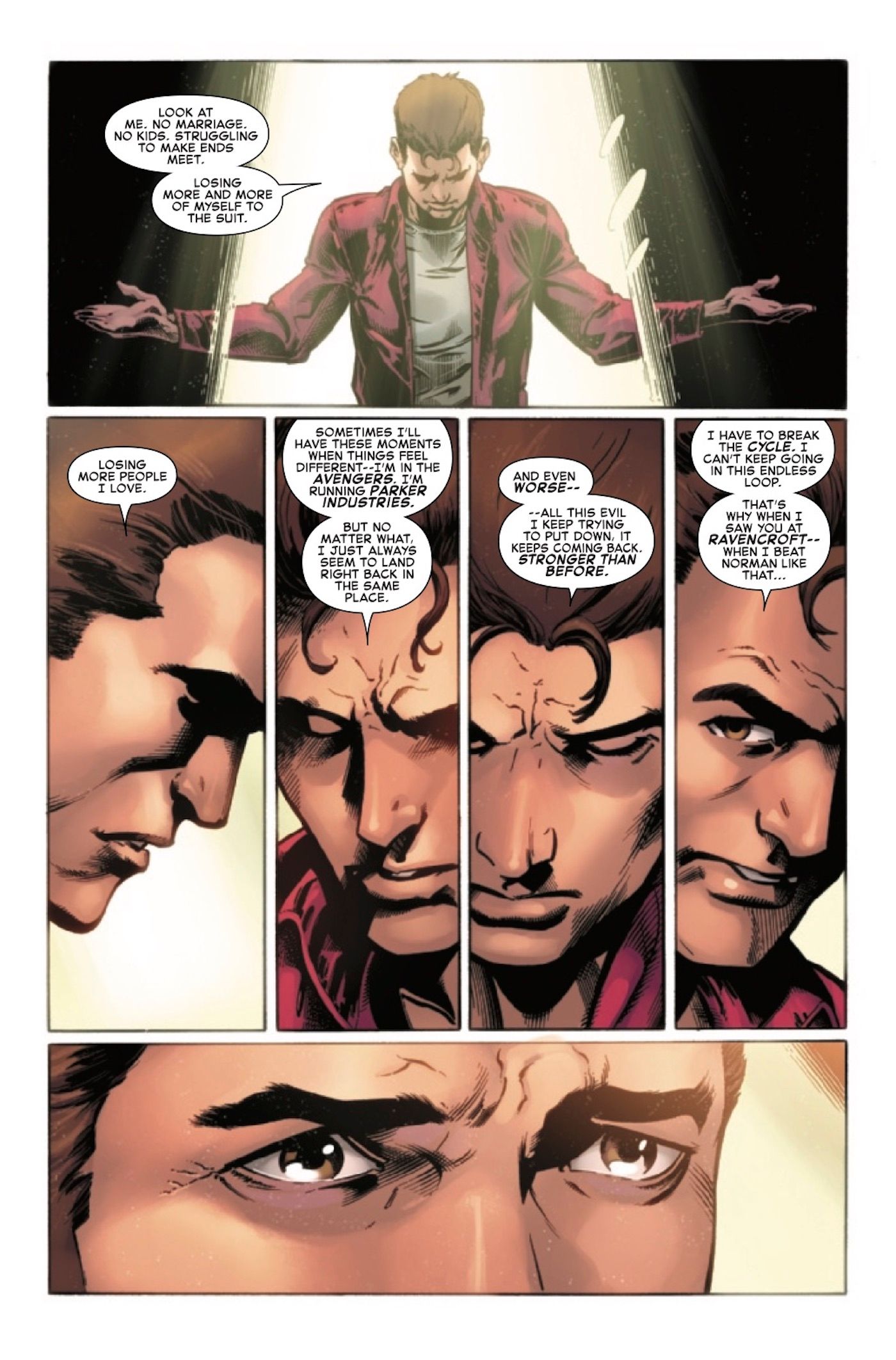Warning! Spoilers ahead for The Amazing Spider-Man #60
Spider-Man just pointed out a major problem present in both his life and modern superhero comics in general. The revelation comes during a monologue that Mary Jane encourages him to do in order to work through his feelings about his recent fight with Kindred. The villain was revealed to be Peter’s childhood friend Harry Osborn, who wanted the webslinger to realize that, even though Spider-Man works so hard to save the ones he loves, he is actually the cause of all their suffering.
Writer Nick Spencer’s entire run on the The Amazing Spider-Man series has forced Peter to reconcile with his past. Kindred has sought to make Spider-Man acknowledge his greatest sin, one which Peter himself cannot remember. Many believe this to be the controversial “One More Day” storyline, where Spider-Man and Mary Jane made a deal with the demon Mephisto in order to save Aunt May. The trade that they had to make was that they would sacrifice their marriage, as well as several major changes in their lives, like May learning he was Spider-Man or his identity being exposed to the world. Another caveat of the deal is that Spider-Man does not even remember making it.
In The Amazing Spider-Man #60, written by Spencer with art by Mark Bagely, Spidey imagines he is addressing Kindred while delivering his therapeutic monologue. He acknowledges that Kindred may be right that he causes a lot of suffering to those he loves. But then he goes further and talks about how he feels trapped in a cycle of punishment, never moving forward. While there may be occasional times when things feel different, like when Spider-Man joined the Avengers or was running Parker Industries, he always ends up right back in the same place. It’s hard not to see this as a critique of Spider-Man comics and major superhero comics in general. Heroes like Spider-Man go through huge events in their lives like marriage or death, but often these developments are temporary before their worlds revert back to the status quo.
Stan Lee referred to this practice in comics as the “illusion of change.” The idea is to make readers feel like the story is progressing and characters are evolving, but to always take them back to their status quos. Peter Parker might go through phases where he’s a major CEO, or he’s a clone, or his mind is taken over by Doctor Octopus. But once those stories run their course, he ends up back where he started as a down-on-his-luck hero. The “illusion of change” makes a certain sense from a business point of view, as publishers don’t have to worry about major continuity changes turning off potential readers. Often when a publisher reverts a hero back to their most "classic" and recognizable form, it just so happens to coincide with the release of movies featuring those characters. People familiar with just the bare bones of Spider-Man’s premise, or know him from the movies, can pick up a comic book and see a version of the character they’re familiar with. But for longtime readers, it can be extremely frustrating, as they know that any major changes to a hero’s life will most likely be undone at some point.
“One More Day” was the ultimate example of the idea of the “illusion of change.” Marvel believed that the story developments the Spider-Man comics had gone through, like his marriage to Mary Jane or his evolving relationship with Aunt May, had strayed too far from his original premise. Rather than come up with organic ways to undo these elements – or better yet, trust that readers will accept these changes and want to see their favorite characters taken in new directions – Marvel instead decided to wave a magic wand and do away with it all. It's no surprise that it remains one of the most hated stories in Spider-Man history.
Spencer’s writing on The Amazing Spider-Man shows that he clearly knows and appreciates the character’s history and that he views “One More Day” as a sin that must be addressed. So it makes sense that he would write a Peter Parker who is frustrated with the idea that he is always running in place and never moving forward. Readers can only hope that Spencer’s run will see new changes in the webslinger’s life that actually last. This can create all sorts of story possibilities that take Spider-Man in exciting new directions, but only if Marvel doesn’t retcon them away at the first opportunity.


